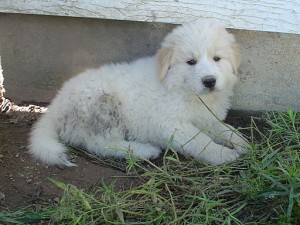Dogs have long been providing us human beings with innumerable services. Humans have been selectively breeding dogs for thousands and thousands of years to get different types that can do certain jobs for us. We have dogs that are bred to be nice companions and good lap warmers, personal protectors, sled pullers, rescuers, hunters, trackers, herders, and even guardians of our flocks.
For a homesteader, protection of your animals is important. If you are keeping cattle, sheep, alpacas, goats, or other livestock, you are vulnerable to loss from predators. For many years, farmers and shepherds have taken advantage of dogs’ protective abilities to take care of these prey animals. You may have wolves, coyotes, or even human thieves targeting your flock, and the loss of just one animal can mean a big difference to your family’s income or food source. With a properly trained dog on the farm, you can avoid these losses.
A guardian dog for your livestock should prefer to be with the flock rather than in the home with people. This is a unique trait in these types of breeds. Part of this comes from genetics and instinct, and the rest comes from being raised from a puppy to live outside with the livestock. The dog generally considers itself to be a member of the flock and does not require much training to protect its mates. The protective instinct should be natural, but you may need to invest time in correcting other behaviors that are undesirable.
Selecting A Breed
 It is firstly important to understand that there is a difference between a herding dog and a livestock guard. Herding dogs are specifically bred to be willing and able to lead groups of livestock and to keep them in order. Although it may vary by individual animal, in general, herding dogs do not have the instinct to protect their herd or the capability. Livestock-guarding dogs are breeds of dog that are not instinctual herders, but who do bond with livestock and feel the need to protect them from predators.
It is firstly important to understand that there is a difference between a herding dog and a livestock guard. Herding dogs are specifically bred to be willing and able to lead groups of livestock and to keep them in order. Although it may vary by individual animal, in general, herding dogs do not have the instinct to protect their herd or the capability. Livestock-guarding dogs are breeds of dog that are not instinctual herders, but who do bond with livestock and feel the need to protect them from predators.
Livestock-guarding breeds are not very common, but you should be able to find several breeders throughout the U.S. that can provide you with a quality puppy. Breeds that make good guards include the Anatolian shepherd, Great Pyrenees, Komondor, and Kuvasz. Less common guard dogs are the Maremmas and Akbash. Other dogs that may be suitable for livestock guarding include the Bernese mountain dog or the Tibetan mastiff.
The Great Pyrenees is probably the most commonly used livestock-guarding breed in the U.S. They originated in ancient times in the Pyrenees Mountain area of France and are thought to have originally come from present-day Turkey over 10,000 years ago. These dogs are extremely loyal, devoted to both their flock and their human family, and make excellent guards.
Keep in mind that all of the dog breeds that were designed to guard livestock are going to be naturally independent, stubborn, and strong-willed. They are wary of strange dogs and strange people and tend to be aloof even with their human family. Do not expect this to be a dog that will rush up to greet you or roll around for a belly rub. They are devoted to their guarding jobs.
When you have selected a particular breed, be sure to find a reputable and experienced breeder from whom to purchase a puppy. This should be someone who has already raised several litters of successful livestock dogs. They should be able to give you references from previous purchasers who are happy with the dogs they got. You will also need to select an individual puppy. The breeder should be able to help you with this task, knowing that you will be raising it to guard your flock. Look for a puppy that is confident and alert and that barks when suspicious of a new person. If possible, observe the puppies in contact with livestock before making a choice. Selecting a male or a female should not make any difference to the success of your endeavor. For a typical homestead and flock, just one dog should suffice.
An Old-Fashioned Approach To Modern Homesteading – No Farm Required
Socialization
Fortunately, if you select the right breed and the right puppy, most of what you hope he will do will be instinctive. Good, early socialization, however, is important in bringing out that instinct. By the time your puppy is about seven or eight weeks old, it is time for him to live with and bond with his flock. It is essential that your guardian live with the animals he will be protecting from an early age. This creates the bond and develops the instinct to protect the livestock. By twelve weeks of age, it could be too late for your puppy and livestock to form a bond.
Place your puppy in a small but secure enclosure with a few members of the flock. The enclosure should be about 150 square feet and should contain three to six sheep, goats, or whatever animals he is going to be protecting. If the area is not secure, he may escape and try to return to the house. It may seem cruel at first to abandon a puppy to the enclosure, but he will become close with his pen mates and will soon be very happy there.
Make sure that the animals you put in the pen with the puppy are gentle, but also give him an area, such as a doghouse, to which he can retreat if necessary. Keep the puppy’s food in this area, but make the water communal to force mingling between the animals. Check on your puppy several times each day for a few days to make sure he is safe and that all is going well. After that, if there are no issues, check on him at least once a day and check on his food and water. It is a good idea to have all members of the family or household visit with the dog each day. He needs to know which people are allowed near the flock in the future or you risk him guarding against your family members.
When your puppy is around sixteen weeks old, you can move him and his pen mates into the larger enclosure with the rest of the flock. He should be socialized enough at this point to do well with the whole group. Naturally, your puppy will explore and likely slip out of the enclosure. If he does not return soon to the flock, take him back and encourage him to stay. You may need to repeat this several times, but eventually he will choose to stay with his flock. As he becomes a true guardian, it will be a good thing that he leaves the enclosure. Good guard dogs patrol the borders.
Training
If the above socialization goes well, you should not need to do much training with your guardian dog. There are a few commands, however, that will help make him better at his job and make him easier for you to control. The ability to tell him no or stop or to correct a bad behavior is essential, especially when he is still young and playful. A common problem with young guardians is that they often want to play with the sheep or other livestock and can be too rough with them. Discourage this behavior early on with a good shake of his scruff, and he will soon learn that it is not acceptable. Also discourage too much aggression. You want him to deter human intruders, but not attack at will. Teach him that jumping or biting at strangers who are with you is not acceptable.
Commands such as stop and come are very useful for maintaining control of your livestock dog. Use positive reinforcement, which means giving him something good, like a treat, when he does what you want. Practice saying “come” and holding out a treat. When he approaches you, give him the treat. Increase the distance and make the treat less noticeable as he gets better at obeying the command. After regular practice, he will understand when you want him to come over to you. Use the same technique of positive reinforcement to teach him the stop or leave it command for undesirable behaviors.
Beyond these simple commands and behaviors, there is not much to teach your livestock dog. He should take to his duties like a natural. Just be careful not to go overboard in keeping people away from him while he is forming his bond with the flock. It is important that you are able to handle him even though he would rather hang around his animals. You need him to obey you, and you need to be able to take him to the vet and let other people handle him, which means that you need to strike a balance between his socialization with the flock and with people.
©2012 Off the Grid News
 Off The Grid News Better Ideas For Off The Grid Living
Off The Grid News Better Ideas For Off The Grid Living




